Erstellt am: 31. 3. 2012 - 07:14 Uhr
Extreme Medicine - Inside MSF
- fm4.orf.at/realitycheck
- Reality Check Podcast
- Dieses Reality Check Special gibt es am Samstag, 31. März 2012, um 12 Uhr on air und nach der Sendung hier zu hören.
Of her three missions as a Médecins sans Frontières nurse, it`s an episode of sheer terror that sticks mostly vividly in Priska Bedner`s mind. The young Tyrolean was working in a hospital tent in war-torn Ivory Coast when two gunmen burst into the ward and tried to drag one of her patients away, saying the wounded man was a wanted militiaman.
Priska, who is slightly built and looks much younger than her 30 years, stood in front of the patient and refused to let the armed men near him, insisting that his treatment was not yet finished.
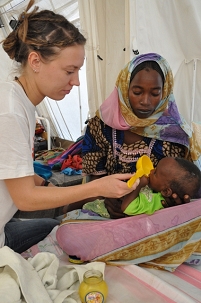
msf
The men with guns became aggressive and slapped the patient in the face. “I was really scared because they had these massive weapons and I was worried they might start shooting at any moment.”
Priska won the face off. The gunmen backed down, leaving the tent to the nurse and the patient to her care. Back in Austria, she tells the story in a matter of fact, dispassionate way, picking it out as an example of the difficulties she experienced while working in a war zone. There`s no sign of pride in what was an extraordinary moment of courage. Did she surprise herself?
“Throughout my time at MSF I was pushed to my limits and beyond. I did loads of things I never dreamed I could do.”
Not just anyone can become a MSF medic. There is a rigorous selection and training process, involving simulated stress situations to test psychological strength of the volunteers as well as their capabilities of working together in a team.
Yet no simulation can prepare the volunteers for the situation that will greet them when they land for their first day’s work in the field. As Marcus Bachmann, a project coordinator and veteran of nine missions, says “I think, if we are honest, all MSF workers admit to being overwhelmed during their first days.”
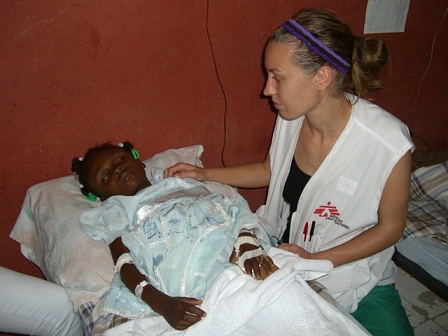
msf
Priska`s first mission was to Haiti, the western Hemisphere`s most impoverished country, which was recently devastated by an earthquake. She arrived during a cholera crisis and was taken immediately to a makeshift treatment centre in a giant sport`s hall. A hundred patients were lying on the floor, their drips attached by string to a sort of washing line pulled taught between the walls of the hall.
Cholera is a horrible, messy disease. It`s nicknamed the “blue death” because patients lose so much fluid through uncontrollable diarrhea and vomiting that their dehydrated skin becomes almost translucent. You can only imagine the scene. Priska had 6 years of nursing experience behind her, but that was in the sterile orderly environment of the urology ward of Innsbruck`s University Hospital.
She says she just stood there at first thinking “Oh my God, what am I supposed to do?”
Throughout those early days and weeks there were moments when she admits thinking that “I wasn’t up to the challenge and I wanted to go home.”
It was the help, support and kind words of her more experienced colleagues that helped her through the difficult times, although In these stress situations, the experience and counseling of the old campaigners is clearly priceless, but coordinator Bachmann says he always makes sure that there are a few first-timers on the teams her puts together. “We need their naivety,” he says. “We need their idealism to remind us what we are trying to do.” It`s easy get too emotionally numbed by repeated exposure to these incredible situations, there is a danger of becoming cynical, and let the extraordinary feel normal.
Idealism is important, of course, but lack of infrastructure, time pressure, precarious security situations and lack of funding mean that MSF volunteers are forced to make compromises every day. These logistical problems endanger the health of the workers. In the Ivory Coast, for example, Priska ran out of surgical gloves and she had to replace bandages with bare hands in a region where the infectious diseases HIV and hepatitis are endemic. “While we were waiting for the new batch of gloves I did have a really uneasy feeling at work,” she admits.
In charge of a team of local nurses, Priska had to make sure no syringes or gloves were wasted and that the enough replacements had been ordered. “And if you get it wrong patients could die.”
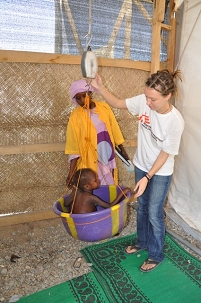
msf
Worse, says Priska, is when logistical challenges mean you can’t provide the job to the best of your ability.
Diagnostic accuracy is the main challenge. Medics from the West are used to relying on blood tests from the most modern laboratories as well as CT scans to pinpoint the exact source of a problem. MSF often tries to provide laboratories, but the intermittent power supply common to crisis situations doesn’t allow anything too sophisticated. So medics have few parameters on which to base their treatment plans and a certain amount of guesswork is inevitable.
“This is where our new medics need the most coaching.” says Bachmann, “it is a totally new and very difficult situation for them.”
Inevitably, on a regular basis, all MSP expats face that heartbreaking scenario of losing a patient to a condition or injury that they know could have been easily successfully treated in the western clinics where they learned their trade.
For funding, the organization is reliant on the generosity of its donors. When you know that you could make a bigger difference if only resources weren’t so tight it can be very frustrating. Small but vital details are regularly lacking. “Often you wish people had just donated a hundred euros more so that we could have quickly bought enough blankets for the children,” says Priska, “It doesn’t sound like much but it could save lives.”
The young nurse says her greatest fear before joining MSF and heading to Haiti was kidnapping. It’s an ever present worry in the volatile countries in which the medics operate. Two years ago two European MSF volunteers were snatched in Haiti. They were released unharmed, but in October last year two more European aid workers were kidnapped while on MSF duty in Kenya and remain missing. All four victims were women. As project coordinator, Marcus Bachmann is ultimately responsible for the safety of his teams. “If anything keeps me awake at night, it is worrying about that,” he says.
Priska was reassured by the stringent safety precautions. Medics can’t leave the MSF compound alone. They have to travel everywhere by car and never on foot. For obvious security reasons, MSF volunteers can’t simply go to a bar to unwind from another adrenaline-filled, nerve-wearing day. If that sounds claustrophobic, Priska says the workers quickly get used to it. She says they usually sit together in a colleague’s room and discuss the day over a beer. “It`s all we can do, but it really helps.”
Not surprisingly when living, working and relaxing at such close quarters your MSF colleagues quickly end up feeling like a surrogate family and sometimes more. Frequently love blossoms among the medics. Priska met her boyfriend, a Swiss doctor, during that first mission to Haiti. It was Love in the Time of Cholera set in the Caribbean. Gabriel Garcia Marquez would be delighted.
A recently released documentary Living in Emergency, made by first time director Mark N. Hopkins, gives us a fly on the wall glimpse at the stressful work of MSF medics in the field. It`s a warts and all portrayal, which includes much criticism of the set up at MSF. There are recriminations from local staff and a 26-year old doctor rails against the logistical problems that are hampering his work. Yet the organization, which had no editorial influence, has embraced the film as an honest portrayal of how difficult life can be on mission. They even use it as a teaching tool.
In the documentary, the doctors are caught being tetchy and the films including compelling scenes where the stressed doctors get drunk together and rant rather boorishly about the development work of the United Nations. As the New York Times aptly put it, it is a vision of saints with their halos removed. The medics are often flawed characters, overtired and full of doubts, but full of passion as well as warmth for each other and their patients.
The star is undoubtedly the Italian doctor, Chiara Lepora, a veteran head of mission at age 30, a genius in conflict resolution, whose compassion, patience and resolute common sense carries the film. As a group of medics dance the night away like the young people that, despite their heroics, they overwhelmingly are. Addressing the frequent inter-medic romance Dr Lepora says with a sly smile: “We are surrounded by death. And sex, well sex is life.”
The pain of leaving is one of the most poignant issues dealt within the film. IT`s a theme that resonates with Tyrolean nurse Priska. MSF missions are by definition stop-gap solutions. They are attempts to help in a crisis, not to replace the health systems of poor countries. That would not only be impossible to finance but probably counter-productive in the long term since it might take responsibility away from national governments.
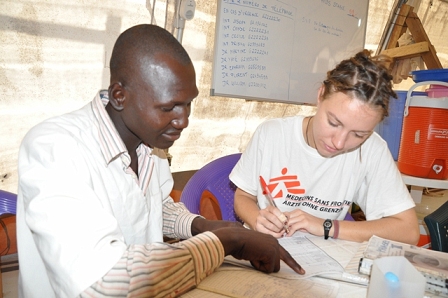
msf
But for the workers on the ground that means leaving when they know there are so many people who still need help – a heart-wrenching experience for any passionate medic.
It`s not only the patients that are left behind. MSF employs around 25 local staff for every expat volunteer. When the mission ends these people are left jobless. “That situation really hurt me,” says Priska.
Life on mission is so extreme that it can make coming home a new challenge. It`s the luxuries that we take for granted which thrill Priska the most when she arrived back in Tyrol: “It`s wonderful being able to drink water out of the taps!” The need to talk about the experiences of the field is great, and psychologically important, and yet it is sometimes hard to relate to old friends. “When I`m telling a story about a difficult or sad experience I have had while on mission for MSF, I get the impression that some people just don’t want to hear about it. It`s as if they don’t want to be dragged out of their comfortable world.”
Returning medics have access to MSF psychologists on the end of a phone line or, if needed, in person. Priska always takes advantage of this support.
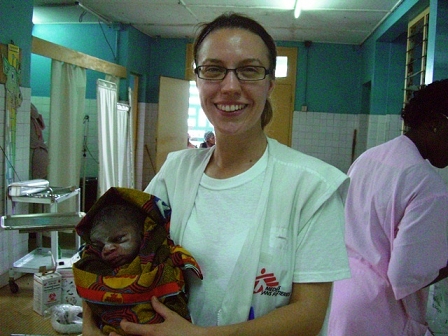
msf
It is a draining existence and only a few first-timers return for follow-up missions. But a select few like Priska return. They are largely unsung heroes in a celebrity obsessed age. “It`s the challenges you face, the people you meet. The positives far outweigh the negatives,” she says.
Zum Anhören
Das Reality Check Special hinter den Kulissen der Ärzte ohne Grenzen:
Dieses Element ist nicht mehr verfügbar
Für unterwegs gibt's die Sendung auch als Podcast.


